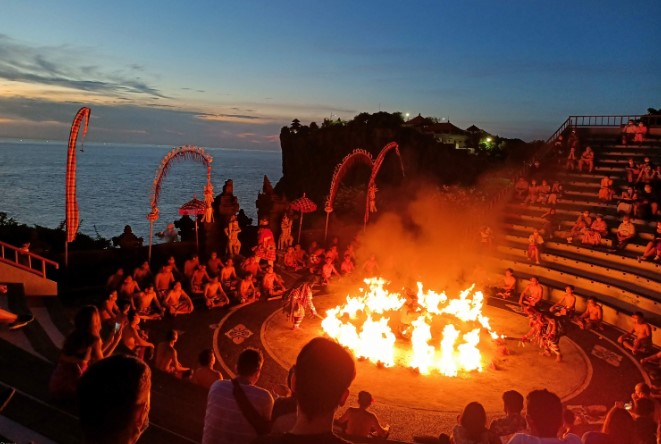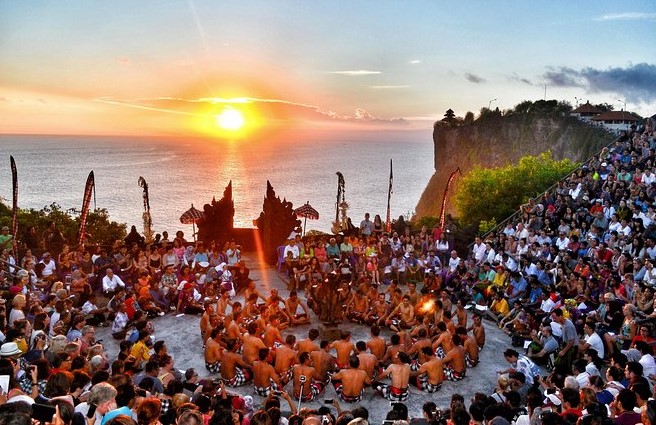Kecak Dance Uluwatu Time Schedule, Price, and Location – English. Are you planning to visit Bali and experience the famous Kecak Dance at Uluwatu Temple? This traditional Balinese dance is a must-see for anyone interested in the island’s rich cultural heritage. In this article, we will provide you with all the information you need to know about the Kecak Dance Uluwatu, including time schedule, price, and location.
Discovering the Spellbinding Kecak Dance Uluwatu Time

The rhythmic chant of “kecak” reverberates against the orange hues of the setting sun, creating an atmosphere of enchantment and wonder. This performance is an artistic masterpiece that blends intricate dance moves, harmonic melodies, and a captivating storyline.
The Essence of Kecak Dance Uluwatu Time
Imagine a circle of performers adorned in traditional Balinese attire, chanting and moving in harmony. The Kecak Dance Uluwatu is a living depiction of the Ramayana epic, an ancient Indian legend. This enchanting performance narrates the tale of Prince Rama’s quest to rescue his beloved wife, Sita, from the clutches of the demon king Ravana. The dancers, through their graceful movements and vocal harmonies, bring this story to life, creating an awe-inspiring experience for the audience.
The History and Cultural Significance
The origins of the Kecak Dance Uluwatu can be traced back to the 1930s when German artist Walter Spies collaborated with Balinese dancer Wayan Limbak to create a new form of dance drama. The Kecak Dance, as it came to be known, was influenced by traditional Balinese rituals and rituals, such as the Sanghyang trance dance. Over the years, it evolved into the captivating spectacle we witness today. This dance not only entertains but also preserves and showcases the rich cultural heritage of Bali.
The History and Cultural Significance
The origins of the Kecak Dance Uluwatu Time can be traced back to the 1930s when German artist Walter Spies collaborated with Balinese dancer Wayan Limbak to create a new form of dance drama. The Kecak Dance, as it came to be known, was influenced by traditional Balinese rituals and rituals, such as the Sanghyang trance dance. Over the years, it evolved into the captivating spectacle we witness today. This dance not only entertains but also preserves and showcases the rich cultural heritage of Bali.
The Perfect Fusion: Dance and Sunset

One of the most enchanting aspects of the Kecak Dance Uluwatu Time is its timing during sunset. The performance takes place at the iconic Uluwatu Temple, perched on a cliff overlooking the Indian Ocean. As the sun dips below the horizon, the dramatic backdrop of the ocean adds a touch of magic to the already captivating show. The interplay of colors, lights, and shadows elevates the experience, making it a visual and emotional feast for the senses.
Experiencing Kecak Dance Uluwatu Time
To fully immerse yourself in the allure of the Kecak Dance Uluwatu Time, consider these tips:
- Arrive Early: The popularity of the performance means that it can get crowded quickly. Arrive well in advance to secure a good spot.
- Respect the Tradition: The Kecak Dance is a sacred art form. Respect the performers and the space by refraining from any disruptive behavior.
- Dress Appropriately: Bali’s warm climate might tempt you to dress lightly, but remember that the performance takes place at a temple. Modest attire is recommended out of respect for the culture.
Kecak Dance Uluwatu Time Schedule
The Kecak Dance Uluwatu Time is typically performed in the late afternoon, just before sunset. The exact timing varies with the season, so it’s advisable to check with local sources or the official Uluwatu Temple schedule to get the most accurate information. Arriving early not only secures your spot but also allows you to explore the temple grounds and enjoy the breathtaking views.
Location of Kecak Dance Performance
The Kecak Dance Uluwatu takes place inside the Uluwatu Temple area, located in the southern part of Bali. To watch the performance, you must enter the temple’s outer space, which offers a stunning view of the Indian Ocean. The temple is perched on a cliff, and the Kecak Dance is staged in an open-air amphitheater, making it a unique and unforgettable experience.
Price
The price for experiencing the mesmerizing Kecak Dance Uluwatu can vary depending on several factors. Generally, the admission fee for the Kecak Dance performance at Uluwatu Temple ranges from approximately $10 to $15 USD per person or around 150,000 rupiahs. However, it’s advisable to check with local sources or official websites for the most up-to-date information on pricing, as rates can change based on factors such as peak tourist seasons and any additional offerings that might be included in the ticket.
As the sun sets on the horizon, and the melodic chants intertwine with the dance, the Kecak Dance Uluwatu Time casts a spell that transports you into the heart of Balinese culture and tradition. This captivating performance is not just a show; it’s a glimpse into the soul of a people deeply connected to their heritage. So, if you’re seeking an unforgettable experience that merges art, mythology, and nature, make sure to witness the enchanting Kecak Dance Uluwatu Time on your next visit to Bali.
Immerse yourself in the mesmerizing world of Balinese art and storytelling as you witness the graceful movements and harmonious chants of the Kecak Dance. With the freedom and flexibility offered by Get&Ride Rental Car Bali, you can explore this cultural gem at your own pace, ensuring a seamless and unforgettable journey.
FAQ
The Kecak Dance Uluwatu is a traditional Balinese dance performance that tells the story of Ramayana, an ancient Hindu epic. It features a group of male dancers chanting “cak” in unison, accompanied by traditional Balinese music and mesmerizing fire dances.
The Kecak Dance Uluwatu time started every day at 6:00 PM, just before sunset. The performance lasts for about an hour.
The ticket price for the Kecak Dance Uluwatu is currently 150,000 rupiahs. However, this price does not include the cost of admission to the Uluwatu Temple, which is an additional fee.









